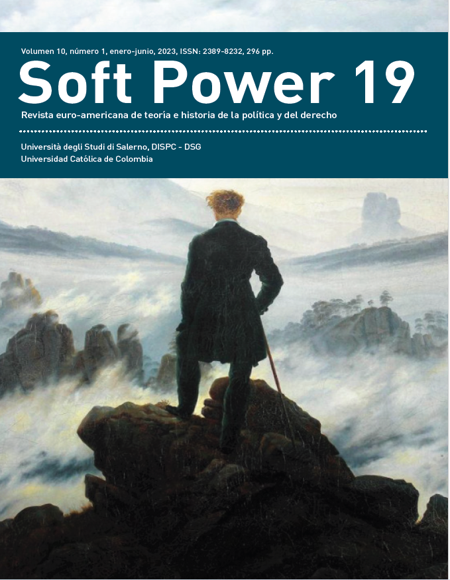
This work is licensed under a Creative Commons Attribution-NonCommercial 4.0 International License.
Al enviar los artículos para su evaluación, los autores aceptan que transfieren los derechos de publicación a Soft Power. Revista Soft Power para su publicación en cualquier medio. Con el fin de aumentar su visibilidad, los documentos se envían a bases de datos y sistemas de indización, así mismo pueden ser consultados en la página web de la Revista.Abstract
En sus últimos escritos, Bruno Latour identifica una profunda mutación de nuestra relación con el mundo cuyos resultados recaen en la dimensión de la naturaleza y de la especie humana. El problema de la unidad del mundo que evocó a partir de la cesura del Antropoceno coincide con una visión dominada por la tecnología que conduce a un Leviatán climático planetario que, en otras palabras, representa una organización planificada de los fenómenos naturales hasta ahora desconocida. Nuestro aporte apunta a reflexionar sobre las preocupaciones que el régimen del cambio climático (y su relación con lo político) lanza en un mundo desafiado por la emergencia. Se enfatiza que la adecuación de lo político produce nuevas técnicas de gobierno de la emergencia en la medida en que el – demos realidad constituida por un agregado de cuerpos, entidades biológicas y políticas – es excluido de decisiones cruciales que conciernen a lo político.

References
Adamin, M. J. (2008). Environmental (In)justice in Climate Change. En: S. Vanderheiden
(Eds.), Political Theory and Global Climate Change (67-87). MIT Press.
Bazzicalupo, L. (2018). Ambiguity of the neoliberal government, including selective inclusion
and re-territorialization. Soft Power. Revista euro-americana de teoría e historia
de la politica y del derecho, 5(1), 38-50.
Beckett, G. (2013). The politics of emergency. Reviews in Anthropology, 42(2), 85-101.
Bhatia, U. (2018). Rethinking the epistemic case against epistocracy. Critical Review of
International Social and political Philosophy, 23 (6), 706-731.
Burchel G., C. Gordon & P. Miller (Eds.) (1993). The Foucault effect: studies in governmentality,
Chicago University Press.
Collier S.J. & A. Lakoff (2021). The Government of Emergency: Vital Systems, Expertise,
and the Politics of Security. Princeton University Press.
Crawford, K. (2021). Atlas of AI Power. Power, Politics, and the Planetary costs of Artificial
Intelligence. Yale University Press.
Farinelli, F. (2009). La crisi della ragione cartografica. Giulio Einaudi Editore.
Foran, J. (2020). What is climate x? An essay on Joel Wainwright and Geoff Mann’s Climate
leviathan: A political theory of our planetary future. Rethinking Marxism, 32(4),
-424.
Foessel, M. (2023). Le cosmos, la nature, le monde: Le tournant ontologique des critiques
de la modernité. Esprit, 1, 113-123.
Foucault, M. (2007). Security, territory, population: lectures at the collège de France,
-1978, eds. A. I. Davidson, translated by G. Burchell. Palgrave Macmillan.
Grundmann, R. (2007). Climate change and knowledge politics. Environmental politics,
(3), 414-432.
Jamieson, D. (2014). Reason in a Dark Time: Why the Struggle Against Climate Change
Failed–and What It Means for Our Future. Oxford University Press.
Jeffrey, A. (2018). Limited epistocracy and political inclusion. Episteme, 15(4), 412-432.
Lascoumes, P. (2004). La Gouvernementalité: de la critique de l’État aux technologies du
pouvoir. Le Portique. Revue de philosophie et de sciences humaines, 13-14.
Latour, B (2017). Facing Gaia: Eight Lectures on The New Climatic Regime; translated by
C. Porter. Polity.
Latour, B. (2021). After lockdown: a metamorphosis; translated by Julie Rose. Polity.
Lemke, T. (2007). An indigestible meal? Foucault, governmentality and state theory. Distinktion.
Journal of Social Theory, 8(2), 43-64.
Lewis, S. L. & M.A. Maslin (2015). Defining the Anthropocene, Nature, 519(7542), 171-
Lombardi, E. (2017). For a Critique of Neoliberal Green Economy. A Foucauldian Perspective
on Ecological Crises and Biomimicry. Soft Power. Revista euro-americana de
teoría e historia de la politica y del derecho, 1, 169-185.
Longo M, Preite G., Bevilacqua E. & A. Lorubbio (Eds.) (2020). Politica Dell’emergenza,
Tangram Edizioni Scientifiche
Mann G. & J. Wainwright (2018). Climate Leviathan. A political Theory of Our Planetary
Future. Verso
McHugh L. H., Lemos M. C., & T. H. Morrison (2021). Risk? Crisis? Emergency? Implications
of the new climate emergency framing for governance and policy. Wiley
Interdisciplinary Reviews: Climate Change, 12(6), e736.
McNeill J. R., & P. Engelke. (2014). The great acceleration: An environmental history of
the Anthropocene since 1945. The Belknap Press of Harvard University Press.
Northcott, M.S. (2014). A Political Theology of Climate Change. SPCK.
Palano, D. (2018). Il segreto del potere. Alla ricerca di un’ontologia del potere. Rubbettino.
Pelling, M. (2010). Adaptation to climate change: from resilience to transformation. Routledge.
Schmitt, C. (2015a). Land and Sea. A World-Historical Meditation, translated by S. Garrett
Zeitlin. Telos Press Publishing.
Schmitt, C. (2015b). Stato, grande spazio, nomos. Giovanni Gurisatti (Eds.). Adelphi.
Sferrazza Papa, E. C. (2021). Antropologia filosofica, metafisica degli elementi e filosofia
della tecnologia in Carl Schmitt, Politica & Società, 2, 241-260.
Singh, P. (2021). Capitalism, ecology and eco-socialism. En V. Upadhyay & P. Singh
(Eds.), Global political Economy. A Critique of Contemporary Capitalism (353-
. Routledge.
Sloterdijk, P. (2018). What Happened in the 20th Century? translated by C. Turner. Polity
Press.
Sobel R.S. & P. T. Leeson (2007). The use of knowledge in natural‐disaster relief management.
The Independent Review, 11(4), 519-532.
Wainwright J. & G. Mann (2015). Climate change and the adaptation of the political.
Annals of the Association of American Geographers, 105(2), 313-321.







